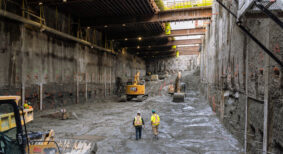Cash flow is the lifeline for any business to not only survive, but to thrive. In B.C., this lifeline for contractors is being severely restricted by payment delays or non-payment.
The urgent need for payment certainty is a longstanding issue that continues to be at the forefront of advocacy efforts across the industry. When contractors are not being paid for up to 90, 120 and 180 days, the financial pressure is detrimental, especially for smaller businesses.
While some companies are large enough to carry millions in late payments, the vast majority of B.C. construction contractors cannot.
Ontario, Alberta, Nova Scotia, Saskatchewan and most recently, the federal government have all enacted prompt payment legislation.
“We’re lagging behind other Canadian jurisdictions in prompt payment. It really places the province and its construction industry at a competitive disadvantage,” said Chris Atkinson, BC Construction Association (BCCA) president, speaking at Buildex Vancouver. “Having payment certainty is critically important.”
He advised that BCCA released a comprehensive cross-jurisdictional report last year that provides a careful analysis of jurisdictions that have implemented prompt payment and adjudication. Atkinson called the report a “foundational document” that will help the province draft legislation that works best in B.C.
“It’s a very important document in this discussion,” he said, noting contractors continue to be under a lot of pressure due to issues related to non-payment and late payment, or unfair contract terms.
The lack of prompt payment legislation is putting significant stress in the system, acknowledged Tim Sportschuetz, lawyer and principal of Sportschuetz & Company.
“Prompt payment is an absolute necessity in B.C.,” he said. “Trade contractors and GCs are calling me out of pure desperation just to get paid for the services that they’ve rendered.”
Payment disputes have increased significantly with interest rate increases wrecking havoc on many project pro formas.
“We’ve seen a material uptick in payment disputes. The amount of claims and liens we’ve registered in the last two years have shot up by 50 per cent easily and have grown in magnitude,” said Sportschuetz. “Enforcing liens is not a cheap endeavour.”
Not being paid for work done and having to chase money owed to you is wrong, stressed Will Pauga, president of Southwest Contracting.
“The toughest part about being a contractor is that you have upfront costs that you have to spend before you can start a project,” he said. “I carry these costs to complete a project. If I don’t get paid, I carry the costs to pay my people and materials – and the longer I wait, the more painful it becomes. And the smallest contractors are impacted the most. They don’t have the banking abilities that I have.”
Don Wightman, president of PML Professional Mechanical, shared similar frustrations. “We need to get paid. The money is just as important if you have three employees or 400. You can’t survive without cash flow.”
He cited as an example how a project his company worked on owed him $5 million and then the GC wanted to change the language in the bond. “It’s financial terrorism. It’s illegal and immoral. The law has to be changed.”
Wightman advised that to enforce a lien claim, it’s not worth taking legal action unless the amount dispute is $1 million or more. “A lien does not get you paid. The Lien Act must be changed,” he said, adding one solution is to be selective of who you work for to avoid payment delays.
Sportschuetz agreed that enforcing liens are very difficult. “Prompt payment is not a panacea. But without it, your options are to register a lien and then spend $1 million in legal fees to enforce your lien. The smaller guys can’t sustain that.”
He explained the adjudication process to resolve payment-related disputes under prompt payment is working well in other provinces. “Within 30 days, a decision is supposed to be rendered,” he said. “Compared to what is currently happening… you might not see a trial for two to three years. And most settle outside court. The cost of going to trial is prohibitive.”
The panel included Tyler Nyvall, legal counsel in the policy and legislation division of the B.C. Office of the Attorney General. He said the industry has been doing a good job of getting the prompt payment message to key government officials but unfortunately there is still no commitment to draft legislation.
Nyvall stressed he is prepared to draft the legislation when directed and will continue working with the construction community to bring attention to the issue. “The government needs reassurance that the legislation is working elsewhere. My job is to give them information and recommendations on the legislation. We’re coming into a provincial election so it’s about getting the government’s attention after the election.”
Cheryl Mah is managing editor of Construction Business.









